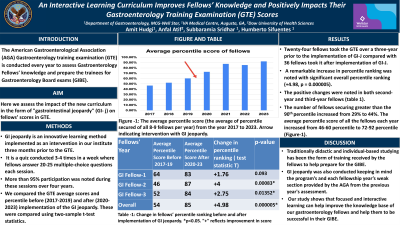Tuesday Poster Session
Category: Practice Management
P4067 - An Interactive Learning Curriculum Improves Fellows’ Knowledge and Positively Impacts Their Gastroenterology Training Examination (GTE) Scores
Tuesday, October 24, 2023
10:30 AM - 4:00 PM PT
Location: Exhibit Hall

Has Audio
- AH
Amit Hudgi, MBBS
Medical College of Georgia at Augusta University
Augusta, Georgia
Presenting Author(s)
Amit R. Hudgi, MBBS1, Anfal Atif, MBBS2, Subbaramia Sridhar, MBBS, MPH1, Humberto Sifuentes, MD3
1Augusta University Medical Center, Augusta, GA; 2Dow University of Health Sciences, Karachi, Sindh, Pakistan; 3Augusta University, Augusta, GA
Introduction: The American Gastroenterological Association (AGA) Gastroenterology training examination (GTE) is conducted every year to assess Gastroenterology Fellows’ knowledge and prepare the trainees for Gastroenterology Board exams (GIBE). Here we assess the impact of the new curriculum in the form of "gastrointestinal jeopardy" (GI- j) on fellows’ scores in GTE.
Methods: GI jeopardy is an innovative learning method implemented as an intervention in our institute three months prior to the GTE. It is a quiz conducted 3-4 times in a week where fellows answer 20-25 multiple-choice questions each session. Points were awarded to each fellow based on their response time which then cumulated overtime to have the top three winners.
More than 95% participation was noted during these sessions over four years.
We compared the GTE average scores and percentile before (2017-2019) and after (2020-2023) implementation of the GI jeopardy. These were compared using two-sample t-test statistics.
Results: Twenty-four fellows took the GTE over a three-year prior to the implementation of GI-J and 36 fellows took the GTE after its implementation over the next four years. A remarkable increase in percentile ranking was noted with significant overall percentile ranking (+4.98, p = 0.000005). The positive changes were noted in both second-year and third-year fellows (table 1). The number of fellows securing greater than the 90th percentile increased from 29% to 44%. The average percentile score of all the fellows each year increased from 46-60 percentile to 72-92 percentile (Figure-1).
Discussion: Traditionally didactic and individual-based studying has been the form of training received by the fellows to help prepare for the GIBE. Here, we show innovative, interactive, and active learning as a way of improving knowledge evidenced by significant improvement in the GTE scores. GI jeopardy was also conducted keeping in mind the program’s and each fellowship year’s weak section provided by the AGA from the previous year's assessment. Our study shows that focused and interactive learning can help improve the knowledge base of our gastroenterology fellows and help them to be successful in their GIBE.

Disclosures:
Amit R. Hudgi, MBBS1, Anfal Atif, MBBS2, Subbaramia Sridhar, MBBS, MPH1, Humberto Sifuentes, MD3. P4067 - An Interactive Learning Curriculum Improves Fellows’ Knowledge and Positively Impacts Their Gastroenterology Training Examination (GTE) Scores, ACG 2023 Annual Scientific Meeting Abstracts. Vancouver, BC, Canada: American College of Gastroenterology.
1Augusta University Medical Center, Augusta, GA; 2Dow University of Health Sciences, Karachi, Sindh, Pakistan; 3Augusta University, Augusta, GA
Introduction: The American Gastroenterological Association (AGA) Gastroenterology training examination (GTE) is conducted every year to assess Gastroenterology Fellows’ knowledge and prepare the trainees for Gastroenterology Board exams (GIBE). Here we assess the impact of the new curriculum in the form of "gastrointestinal jeopardy" (GI- j) on fellows’ scores in GTE.
Methods: GI jeopardy is an innovative learning method implemented as an intervention in our institute three months prior to the GTE. It is a quiz conducted 3-4 times in a week where fellows answer 20-25 multiple-choice questions each session. Points were awarded to each fellow based on their response time which then cumulated overtime to have the top three winners.
More than 95% participation was noted during these sessions over four years.
We compared the GTE average scores and percentile before (2017-2019) and after (2020-2023) implementation of the GI jeopardy. These were compared using two-sample t-test statistics.
Results: Twenty-four fellows took the GTE over a three-year prior to the implementation of GI-J and 36 fellows took the GTE after its implementation over the next four years. A remarkable increase in percentile ranking was noted with significant overall percentile ranking (+4.98, p = 0.000005). The positive changes were noted in both second-year and third-year fellows (table 1). The number of fellows securing greater than the 90th percentile increased from 29% to 44%. The average percentile score of all the fellows each year increased from 46-60 percentile to 72-92 percentile (Figure-1).
Discussion: Traditionally didactic and individual-based studying has been the form of training received by the fellows to help prepare for the GIBE. Here, we show innovative, interactive, and active learning as a way of improving knowledge evidenced by significant improvement in the GTE scores. GI jeopardy was also conducted keeping in mind the program’s and each fellowship year’s weak section provided by the AGA from the previous year's assessment. Our study shows that focused and interactive learning can help improve the knowledge base of our gastroenterology fellows and help them to be successful in their GIBE.

Figure: The average percentile score (the average of percentile secured of all 8-9 fellows per year) from the year 2017 to 2023. Arrow indicating intervention with GI jeopardy after which significant improvement was noted.
Disclosures:
Amit Hudgi indicated no relevant financial relationships.
Anfal Atif indicated no relevant financial relationships.
Subbaramia Sridhar indicated no relevant financial relationships.
Humberto Sifuentes indicated no relevant financial relationships.
Amit R. Hudgi, MBBS1, Anfal Atif, MBBS2, Subbaramia Sridhar, MBBS, MPH1, Humberto Sifuentes, MD3. P4067 - An Interactive Learning Curriculum Improves Fellows’ Knowledge and Positively Impacts Their Gastroenterology Training Examination (GTE) Scores, ACG 2023 Annual Scientific Meeting Abstracts. Vancouver, BC, Canada: American College of Gastroenterology.
